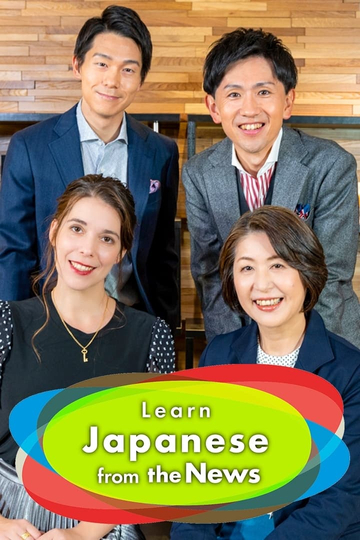Season 1 Episodes
1. Age of Legal Adulthood to Be Lowered to 18 in April
This April, Japan's age of majority will be lowered from 20 to 18. Follow along as we listen to this news story in Japanese, study the word "otona" (adult), and learn about the coming-of-age ceremony.
2. People in Japan Donate 4 Billion Yen to Ukraine through Embassy
Follow along as we listen to a news story in simplified Japanese about people in Japan donating 4 billion yen (as of March 7) to Ukraine through its embassy in Tokyo. Our resident Japanese teacher explains the word "kifu" (donation) and breaks down how to count large numbers such as "man" (10,000) and "oku" (100 million). We also spotlight growing private-sector efforts to provide support to Ukraine, as well as middle school students folding "orizuru" paper cranes, a symbol of peace.
3. Sightseeing Route Reopens in Owakudani Hakone
Follow along as we listen to a news story in simplified Japanese about the reopening of a popular nature trail in the Owakudani area of Hakone, a mountainous resort town with spectacular views of Mt. Fuji. Owakudani is a volcanic valley known for its hot springs and close-up views of Mt. Hakone's billowing steam vents. The nature trail in question had been closed to tourists since 2015 due to increased volcanic activity.
4. Researchers Develop Plastic That Decomposes After Use
Plastic pollution in the ocean has become a global environmental concern. Follow along as we listen to a news story in simplified Japanese about a new plastic developed by researchers at the University of Tokyo that is embedded with enzymes that cause it to naturally break down in water. We also consider the katakana loanword "purasuchikku" (plastic) and learn some related katakana words that are commonly used in everyday life.
5. International Organization Formed to Fight Manga, Anime Piracy Sites
Internet piracy has become a major global issue. Follow along as we listen to a news story in simplified Japanese about copyright-protection groups and government agencies from 13 nations coming together to create an international organization to fight manga and anime piracy on the internet. We study words like "kaizokuban" (pirated version) and "chosakuken" (copyright) and consider copyright infringement pitfalls in the digital age.
6. Frequent “Anomalous” Rainfall in Japan Caused by Rising Temperatures
An American scientific agency used AI to study Japanese precipitation data and found that the rising frequency of abnormal rainfall in Japan is mainly due to human-induced climate change. Follow along as we listen to the news story in simplified Japanese. With the rainy season upon us, we learn some rain-related expressions, as well as terms to know to be prepared for heavy rains and potential natural disasters.
7. Bystanders Use AED to Save Girl Who Suddenly Collapsed at Gym
Follow along as we listen to a news story in simplified Japanese about a group of bystanders who used an automated external defibrillator (AED) to revive a young girl that suddenly collapsed during basketball practice. Japan has widespread deployment of AEDs, but public awareness and preparedness remains an issue. We study Japanese phrases and vocabulary for emergencies, and learn about how to use these lifesaving machines, and where they can be found.
8. Japan Tops Ranking of Tourism Destinations for First Time
Follow along as we listen to a news story in simplified Japanese about how Japan has taken the top spot in a ranking of global travel destinations published every 2 years by the World Economic Forum. In recent years, Japan has been working to increase multilingual signage and provide more resources for international travelers, especially in the run-up to the recent Tokyo Olympics. We learn some useful phrases for getting around town and share some sightseeing tips.
9. More Convenience Stores Offering Prescription Medication Pickup Service
Follow along as we listen to a news story in simplified Japanese about a new service that allows consumers to pick up prescription drugs at convenience stores. In response to the COVID-19 outbreak, the government has eased drug regulations, allowing pharmacists to give usage instructions for medications online. We study Japanese words related to medicine, and learn about some of the many services available at Japanese convenience stores.
10. How to Prevent Heatstroke and Save Electricity on Air Conditioning
Japan is experiencing record-breaking heat, with temperatures exceeding 40 degrees Celsius in June for the first time in the country's recorded history. Follow along as we listen to a news story in simplified Japanese about how to protect yourself from heatstroke by using your air conditioner more effectively — thereby minimizing energy consumption. We learn Japanese words for summer appliances and ways to save energy while beating the summer heat.
11. “Don't Drink and Drive” Applies to Electric Scooters
As the popularity of e-scooters grows, so are incidents of riding under the influence of alcohol. Follow along as we listen to a news story in simplified Japanese about police and an industry group going around to Tokyo restaurants to spread awareness of e-scooter safety. We also study vocabulary words related to traffic rules and also learn about bicycle rules and regulations in Japan.
12. Japan Aims to Restore International Student Numbers to Pre-Pandemic Level
Since the start of the COVID-19 pandemic, the number of international students in Japan has been on the decline. Join us as we listen to a story in simplified Japanese about how the education ministry hopes to restore the figure to the pre-pandemic level by 2027. We also ask an international student now in Japan about their experience so far and how it's widened their horizons.
13. New Services Bring Overgrown Produce to Market
Join us as we listen to a story in simplified Japanese about food vendors that have begun selling overgrown and misshapen vegetables that do not conform to market standards. Their efforts are part of a growing call to action against food loss and waste. We also learn about the distribution and sales of vegetables and fruits in Japan, and spotlight initiatives to reduce the amount of discarded food.
14. Earthquake Drill for International Residents Conducted in Plain Japanese
Join us as we listen to a story about a disaster drill where fire and police officials in Tokyo's Nakano Ward taught around 150 international residents about earthquake safety in plain Japanese. We hear from foreigners living in Japan about their earthquake fears and concerns, and learn where and how to access potentially lifesaving disaster preparedness and emergency information.
15. Number of People Aged 100 and Over in Japan Tops 90,000 for First Time
Join us as we listen to a story in simplified Japanese about centenarians in Japan. This year the number of people aged 100 and over exceeded 90,000 for the first time, marking a record high for the 52nd consecutive year. We also introduce various public and private services that support older adults. For example, since 2012, non-Japanese citizens aged 40 and over who have resided in Japan for more than three months are eligible to enroll in the country's long-term care insurance system.
16. Japan Compiles Measures for Potential Dual Outbreak of COVID and Flu
Join us as we listen to a story in simplified Japanese about measures the health ministry has compiled to prevent fever clinics from being overwhelmed this winter amid growing concerns of a dual outbreak of COVID-19 and seasonal influenza. We also talk about visiting a doctor in Japan as an international resident or traveler, and go over useful Japanese terms for communicating your symptoms and concerns.
17. Studies Underway to Reduce Salt While Maintaining Flavor
Join us as we listen to a story in simplified Japanese about new products being developed that can help people reduce their salt intake without compromising on flavor. The average Japanese diet contains a high amount of sodium, which is a concern as it can lead to high blood pressure and serious health issues. We talk about ways to cook using less salt, and highlight Japanese words and phrases related to cooking and flavor.
18. New Year's Greeting Cards Go on Sale in Japan
In Japan it is customary to send out New Year's postcards known as "nengajoo." Join us as we listen to a story in simplified Japanese about the greeting cards for the coming New Year, which are now available at post offices nationwide. This year Japan Post is issuing 1.64 billion cards—10% fewer than last year, as more and more people are opting to send their season's greetings over email. We also learn commonly used phrases for sending regards both electronically and via post.
19. Using Cameras to Detect Human Presence and Eliminate Accidents at Railway Crossings
Join us as we listen to a story in simplified Japanese about a new security system being introduced by a Japanese railway operator that uses AI and 3D camera imaging to detect human presence at crossings and prevent accidents. We also learn useful train-related terms for everyday life and about safety measures implemented at railway crossings.
20. International Residents in Kagawa Experience the “Henro” Pilgrimage
Join us as we listen to a story in simplified Japanese about the Shikoku Pilgrimage, known as the "Henro" in Japanese. In November, international residents and others in Kagawa Prefecture had the opportunity to trek up to Yashima Temple, the 84th of the 88 sacred Buddhist temples along the journey. On the program we highlight terms related to the Henro, talk about a legendary Japanese cultural figure, learn about temple etiquette and consider the role of religion in Japanese society.























